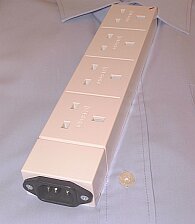|
I am not the most "frequent flyer" but if there is one thing that can get me going it is the hideous devices sold for converting the local mains plug into one from which your equipment can derive some power. They like to refer to them as "travel adapters", but I am convinced they are designed to convert your time away into a hospital stay. One has yet to be found that successfully brings the earth through (it appears to be forgotten). The construction is weak even though they claim to be able to handle hair dryers! Those that claim to be "universal" are so tricky to use that safety has to be called into question. One last issue is you can only power one device, which is a bit of a bind when trying to use a laptop and other pieces of test gear simultaneously (while also trying to charge both the electric razor and digital camera!). However, one thing that does appear to be pretty universal is the power connector found on the back of PCs and peripherals - known as an IEC320. This would mean that in every country one should be able to obtain a power lead for a PC fitted with the correct mains connector, including the Earth - the importance of which becomes rather blatant when using gear with mains filters which have capacitors that make the case live if no Earth were present! Not only is this style of connector used on PCs, but many kettles too. The higher current version has a key to stop lower current leads from being used on high current devices. These cables also have one favourable trait, apart from being available in almost every store, they're relatively cheap!
It took a while to find the style of extension unit wanted being thick enough to accommodate the plug. This one has so much place inside that it will also easily house surge arrestors! Talking of surge arrestors; Please take care if making your travel adapter in the US. Do not use one with built-in surge arrestors as these will be rated for 125VAC and not 250VAC. The result, when using the adapter in countries in Region 1 or 2, the arrestors get a little hot under the collar and pose a fire risk!
The following information is centred on a visitor from the UK to other areas of the world. The UK and Ireland is not covered.
South Africa: 230V, 50Hz.
Trinidad & Tobago:
United Arab Emirates (at this time, Dubai only): 230V, 50Hz
USA & Canada: 110..120V and 220..240V, 60Hz
This is likely to be the only special cord you'll need to make. Such plugs are widely available in electrical outlets, they just tend not to be found on the end of a PC power cord! Note: Please take care; Ensure the energy-thirsty device is switched off before unplugging it (large sparks can occur otherwise). Also, do not be tempted to leave your cord plugged in while you saunter off somewhere, you'll be tempting the hotel manager to leave you a rude note!
As countries are visited, they will be added to this list. Happy travelling!
© 02.01.02 / 12.09.04 |
 The "universal mains adapter" consists of a standard mains 4-way extension with the cord removed and replaced with an IEC320 plug taken from an old PC power supply.
The "universal mains adapter" consists of a standard mains 4-way extension with the cord removed and replaced with an IEC320 plug taken from an old PC power supply.  The standard 2/3-pin wall socket is 110..120V. However, most hotel rooms boast a 230V socket too, but it is usually hidden from view with the air conditioner unit or some other energy thirsty device plugged in to it. The pins are aligned differently to that of a standard socket (see alongside), and is known as a 6-15P (two flat pins) or 6-20P (pins at right-angles) arrangement (the socket usually caters for both).
The standard 2/3-pin wall socket is 110..120V. However, most hotel rooms boast a 230V socket too, but it is usually hidden from view with the air conditioner unit or some other energy thirsty device plugged in to it. The pins are aligned differently to that of a standard socket (see alongside), and is known as a 6-15P (two flat pins) or 6-20P (pins at right-angles) arrangement (the socket usually caters for both).